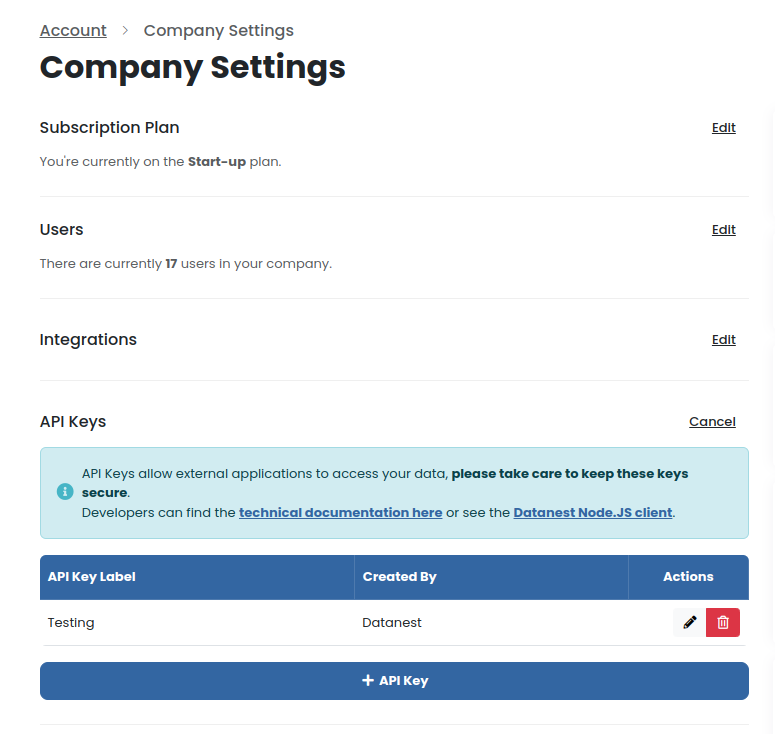This is a Node JS implementation of datanest.earth's REST API client. You should use this lightweight package to easily start using the API.
If you are not using Node.js you can use this package as an implementation example.
Please see the Datanest API documentation for more information. If you need help please contact hello@datanest.earth for technical support.
Your Datanest Account Manager can generate API keys, from the Company Settings page, API Keys section.
If you cannot see the API Keys section it is possible your subscription does not include API access. Please contact us to request API access.
If you wish to use this Node package, you will need to have Node installed on your machine. This package should work with both Bun and Deno runtime alternatives (unverified)
We recommend the latest stable version of Node.
- Tested on Node v20.8.0
Minimum requirements
- Fetch API is required, available in Node v18.0+ (unverified)
node-fetch may allow for earlier versions
Install from NPM using your preferred package manager.
npm install --save @datanest-earth/nodejs-clientAlternatives
pnpm add @datanest-earth/nodejs-clientbun add @datanest-earth/nodejs-clientDatanest's API uses API keys to authenticate requests along with a HMAC signature (see docs) (see implementation example.) The signature may be tricky to implement, so we recommend using this package to get started.
Do not expose your API key and secret in client-side code. This package is intended for server-side use only.
See the Postman Documentation
The client will automatically look for env variables to get the API key and secret. You can use the dotenv package to parse a .env file.
Place your API key in a .env
DATANEST_API_KEY=your-api-key
DATANEST_API_SECRET=your-api-secretSimply instantiate DatanestClient
import DatanestClient from '@datanest-earth/nodejs-client';
import dotenv from 'dotenv';
// Load .env
dotenv.config();
const client = new DatanestClient();
// Optionally you may identify your integration for logging and support purposes
client.setClientId("My Company Integration");Alternatively use the constructor to pass the API key and secret.
import DatanestClient from '@datanest-earth/nodejs-client';
const client = new DatanestClient('your-api-key', 'your-api-secret');Require for CommonJS projects
const { DatanestClient, projects } = require("@datanest-earth/nodejs-client");The client exposes the following methods to make requests to the API.
client.get(path, params?: Record<string, any>, optionalFetchOptions);
client.post(path, params?: Record<string, any>, optionalFetchOptions);
client.patch(path, params?: Record<string, any>, optionalFetchOptions);
client.put(path, params?: Record<string, any>, optionalFetchOptions);
client.delete(path, params?: Record<string, any>, optionalFetchOptions);The underlying Fetch API is used, you can pass in any valid Fetch options as the third argument. For example, to add a custom header.
Example
import DatanestClient from '@datanest-earth/nodejs-client';
import dotenv from 'dotenv';
// Load .env
dotenv.config();
async function listProjects() {
const client = new DatanestClient();
client.setClientId("Company A Version 1");
const response = await client.get('v1/projects');
const projects = await response.json();
console.log(projects);
}
listProjects();This package includes endpoints with type definitions.
Function & Type Definitions:
- Projects API
- Gather API
- Enviro API
- Integrations API
- Company Users API
- Project Teams API
- Files API
- Maps API
- Company Workflows & Custom Roles API
- Webhook Types and Signature Verification
You can also see the TypeScript source code, this can be useful to understand the API request & responses type definitions.
Example
import DatanestClient, { projects as projectEndpoints } from '@datanest-earth/nodejs-client';
import dotenv from 'dotenv';
// Load .env
dotenv.config();
async function listProjects() {
const client = new DatanestClient();
client.setClientId("Company A Version 1");
const page = 1;
const projects = await projectEndpoints.listProjects(client, page);
console.log(projects);
}
listProjects();You can override the default API endpoint by setting the DATANEST_API_BASE_URL environment variable.
DATANEST_API_BASE_URL=https://app.datanest.earth/apiAlternatively, you may set the base url from your code
import DatanestClient from '@datanest-earth/nodejs-client';
const client = new DatanestClient();
client.setBaseUrl('https://app.datanest.earth/api');The client will throw a DatanestResponseError when the API returns a non-200/300 status code.
import DatanestClient, { DatanestResponseError } from '@datanest-earth/nodejs-client';
// Disable the default behavior of logging error status and response data
client.setLogErrors(false);
// With await try-catch
try {
await client.get('v1/projects/' + projectUuid);
} catch (err) {
if (err instanceof DatanestResponseError) {
if (err.status === 404) {
// Something was not found
return;
}
console.error(err.message, err.data);
}
throw err;
}
// With callbacks
client.get('v1/projects/' + projectUuid)
.then(response => {
if (!response.ok) {
throw new DatanestResponseError(response);
}
return response.json();
})
.then(data => {
console.log(data);
})
.catch(err => {
if (err instanceof DatanestResponseError) {
if (err.status === 404) {
// Something was not found
return;
}
console.error(err.message, err.data);
}
throw err;
});- 400: Bad Request
- 401: Unauthorized, likely an invalid API key or request signature
- 403: Forbidden
- 404: Not Found, either the url is incorrect or UUID or ID provided does not exist
- 405: Method Not Allowed
- 422: Unprocessable Entity, this indicates a validation error from your request body
- 429: Too Many Requests, you are being rate-limited
- 500: Internal Server Error - These should not happen, please contact support there is likely an issue on our end

